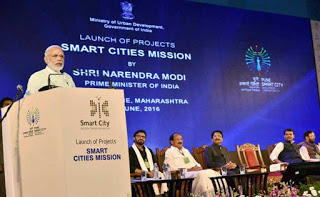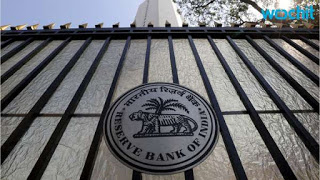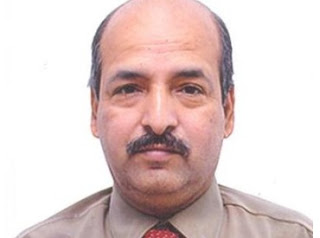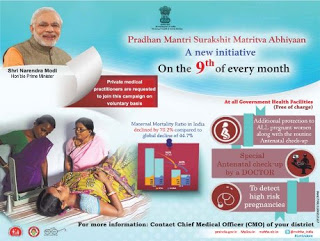Hello and welcome to exampundit . Here are the important Current Affairs of 28th June, 2016. These are important for the upcoming SBI PO Mains & UBI PO PBDBF Exams 2016.
Current Affairs at a Glance – 28th June, 2016
- Prime Minister Narendra Modi on
25 June 2016 launched several projects for 20 Smart Cities in Pune under the
Smart City Mission. The Projects were launched exactly a year after
Union Government launched the flagship Smart City Mission in June 2015 by releasing
the Mission Guidelines. - The Reserve Bank of India (RBI)
on 23 June 2016 released the “Payment and Settlement Systems in India: Vision-2018”.
The vision reiterates the aims of building a “less-cash” society by encouraging
greater use of electronic payments by all sections. - Ola, the mobile transportation
app, has signed a memorandum of understanding (MoU) with the Haryana
government to create over 10,000 entrepreneurs in the state. - N S Vishwanathan is new deputy governor at Reserve Bank of India.
Currently he is serving as an executive director at the central bank. - Pradhan Mantri Surakshit Matritva Abhiyan
(PMSMA), an initiative of the Narendra Modi Government, was launched
in June 2016. The scheme aims at boosting the health care facilities for the
pregnant women, especially the poor. It also seeks to protect pregnant ladies
from infectious diseases. - Uttar Pradesh government in June 2016 declared that all natural calamities
including unseasonal heavy rain, lightning, Loo and storm and others will be
treated as state disaster. - Sweden on 22 June 2016
inaugurated a test stretch of an electric road. With this, the country has
become one of the first countries in the world to conduct tests with electric power
for heavy transports on public roads. - Xerxes Sapur Desai, the man who
founded Titan Co Ltd, died on 27 June 2016 following a prolonged illness
in Bengaluru.
Finance/Banking –
PM Narendra Modi launches Projects for 20 Smart Cities in Pune
- Prime Minister Narendra Modi on
25 June 2016 launched several projects for 20 Smart Cities in Pune under the
Smart City Mission. - The Projects were launched
exactly a year after Union Government launched the flagship Smart City Mission
in June 2015 by releasing the Mission Guidelines.
Highlights of the Projects
- Projects were launched in 20
cities selected in the first batch of mission through a city challenge
competition. - Pune stood second in the selected
cities. - Projects launched in Pune include
slum rehabilitation, street and pedestrian walkway, modern buses with
alternative fuels, traffic demand modelling project and city common mobility
card. - Ahmedabad has launched sewage
treatment plant, housing project, smart learning in municipal schools. - Bhubaneswar, which topped the
list in the city challenge, has launched a railway multi-modal hub, traffic
signalisation project and urban knowledge centre. - In New Delhi Municipal Council, a
mini-sewerage treatment plants, 444 smart class rooms, WiFi, smart LED
streetlights, city surveillance, command and control centre were launched. - The 20 selected cities would be
linked through video conferencing.
Other Launches
- PM Modi also inaugurated the Make
Your City SMART contest aimed at continuing citizen participation in the
planning. Suggestions and designs suggested by the citizens will be
incorporated by respective smart cities. - A Smart Net Portal was also
inaugurated to enable the cities under different urban missions to share ideas
and source solutions for various issues during the implementation of various
missions.
RBI publishes Payment and Settlement Systems in India: Vision-2018
- The Reserve Bank of India (RBI)
on 23 June 2016 released the “Payment and Settlement Systems in India:
Vision-2018”. The vision reiterates the aims of building a “less-cash” society
by encouraging greater use of electronic payments by all sections. - The objective is to ensure that a
robust payments infrastructure is established in the country to increase
accessibility, availability, interoperability and security.
Contours of Vision-2018
The broad contours of Vision-2018
revolve around 5Cs – Coverage, Convenience, Confidence, Convergence and Cost.
revolve around 5Cs – Coverage, Convenience, Confidence, Convergence and Cost.
- Coverage: Enabling wider access to a variety of electronic payment
services - Convenience: Enhancing user experience through ease of use and of
products and processes - Confidence: Promoting integrity of systems, security of operations
and customer protection - Convergence: Ensuring interoperability across service providers
- Cost: Making services cost effective for users as well as service
providers
Four strategic initiatives to achieve 5Cs
To achieve these, Vision-2018
will focus on four strategic initiatives such as responsive regulation, robust
infrastructure, effective supervision and customer centricity.
will focus on four strategic initiatives such as responsive regulation, robust
infrastructure, effective supervision and customer centricity.
- Responsive Regulation: Involve all stakeholders to promote twin
objectives of enhanced coverage with interoperability of the payments system
and convenience with security for the end-users in sync with emerging
developments and innovations. - Robust Infrastructure: Aim is to increase the accessibility,
availability, interoperability and security of the payment systems. - Effective Supervision: Aims to strengthen the resilience of the
Financial Market Infrastructures (FMIs) and System Wide Important Payment
Systems (SWIPS) in the country. This also envisages setting up appropriate
oversight framework for new systems and augmenting the data reporting and fraud
monitoring systems. - Customer Centricity: Envisages streamlining the customer grievance
redressal mechanism, focus on building customer awareness and education, and
initiate customer protection measures.
Ola inks MoU with Haryana govt to create 10,000 entrepreneurs in state
- Ola, the mobile transportation
app, has signed a memorandum of understanding (MoU) with the Haryana government
to create over 10,000 entrepreneurs in the state. - As part of the MoU, Ola will
invest Rs. 350 crore over the next five years to train men and women for
entrepreneurship. Ola will also work with the state government to introduce
mobility solutions such as Ola Auto, Ola Bike, Ola Share and Ola Shuttle across
the state. - Haryana is banking on technology
and skill development amongst the youth for further development in the region.
Appointments –
N S Vishwanathan is new deputy governor at RBI
- N S Vishwanathan is new deputy
governor at Reserve Bank of India. Currently he is serving as an executive
director at the central bank. - The Appointments Committee of the
Cabinet (ACC) made the announcement on 28 June. - Vishwanathan will succeed H R
Khan as the Deputy Governor of RBI on July 3, 2016. - RBI has provision for four deputy
governors, two of whom are appointed from outside while the other two Deputy
Governors are traditionally appointed from those working within RBI.
Gudni Johannesson wins Iceland’s presidential election
- Gudni Johannesson on 26 June 2016
won Iceland’s presidential election. The history professor who ran as an
independent in the election was able to secure 39.1% of the vote. - He will succeed Olafur Ragnar
Grimsson, who served 20 years as head of state. - The elections were held in the
backdrop of the Panama Papers leak in April, which implicated several top
officials of the country. - Johannesson, a history professor,
who is a newcomer in the politics decided to run for the presidency after the
leak and rode a wave of anti-establishment sentiment. - Halla Tomasdottir, a
businesswoman without party affiliation, came second with 27.9%. While David
Oddsson, a former conservative prime minister and central bank governor won
just 13% of the vote.
Sponsored
(adsbygoogle = window.adsbygoogle || []).push({});
India –
Pradhan Mantri Surakshit Matritva Abhiyan: A scheme to boost healthcare
facilities for pregnant women
facilities for pregnant women
- Pradhan Mantri Surakshit Matritva
Abhiyan (PMSMA), an initiative of the Narendra Modi Government, was launched in
June 2016. - The scheme aims at boosting the
health care facilities for the pregnant women, especially the poor. It also
seeks to protect pregnant ladies from infectious diseases. - Under the scheme, the pregnant
ladies will be given free health check-up and required treatment for free on
9th of every month. The scheme will be applicable for pregnant women to avail
in every government hospitals across India.
Key features of Pradhan Mantri Surakshit Matritva Abhiyan
- All kinds of medical checkups
under the scheme will be completely free. - Tests will take place at the medical
centres, government and private hospitals and private clinics across the
country. - Women will be marked differently
based on their health problems so that doctors can easily detect the problem. - The scheme is applicable only to
the women in their pregnancy period of 3 to 6 months. - The women belonging to semi
urban, poor and rural areas will be given preferences.
UP government declares all natural calamities will be treated as state
disaster
disaster
- Uttar Pradesh government in June
2016 declared that all natural calamities including unseasonal heavy rain,
lightning, Loo and storm and others will be treated as state disaster. - As per the decision all victims
of these disasters will be given relief as per provisions made under State
Disaster Relief Fund by the Union government. - A large number of people suffer
due to these natural causes every year and the new system introduced will
greatly benefit the victims and their kin. He also apprised that the
notification in this regard has also been issued. - Besides, bus stations across all
75 districts of state will soon have sanitary napkin vending machines. For this
purpose, the state government is working to install coin-based automatic
sanitary napkin vending machines at bus stations. Expected to be launched on World
Population Day on July 11, the project would be rolled out in three phases.
World –
Sweden inaugurates world’s first electric road
- Sweden on 22 June 2016
inaugurated a test stretch of an electric road. With this, the country has
become one of the first countries in the world to conduct tests with electric
power for heavy transports on public roads. - The test was conducted on parts
of road E16. It involved a current collector on the roof of the truck cab
feeding the current down to a hybrid electric motor in the truck.
Key facts related to the test stretch of the road
- The tests will continue up
through 2018. - They will provide knowledge of
how electric roads work in practice. - It will offer a glimpse on
whether the technology can be used in the future. - The experiment is based on the
government’s goal of energy efficiency and a fossil fuel-free vehicle fleet by
2030. It will also contribute to strengthening Sweden’s competitiveness.
Obituaries –
Xerxes Sapur Desai, founder of Titan, dies
- Xerxes Sapur Desai, the man who
founded Titan Co Ltd, died on 27 June 2016 following a prolonged illness in
Bengaluru. He was 79. - Desai played a key role in
introducing India to its first quartz watch in the late 80s when he set up
Titan Co. Ltd (part of Tata Sons), after enduring years of resistance from
state-owned HMT Watches.
:: DOWNLOAD TODAY’s PDF ::
Regards
Team ExamPundit









